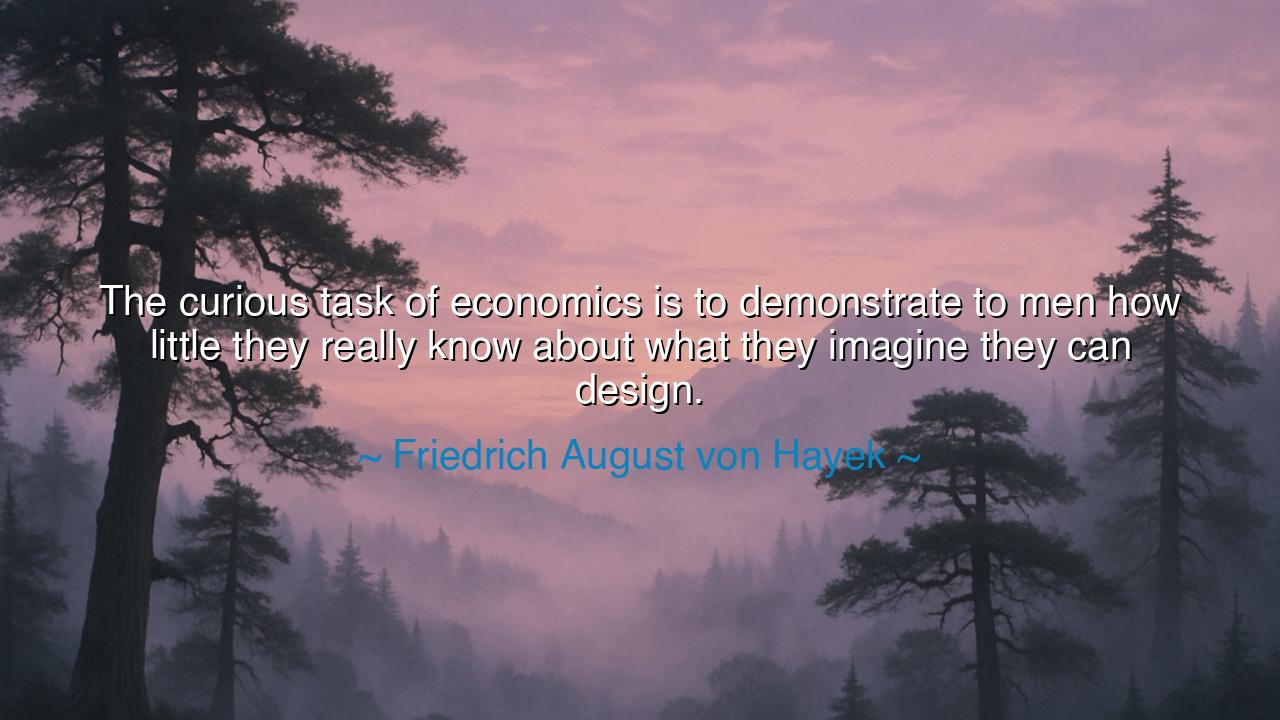
The curious task of economics is to demonstrate to men how little
The curious task of economics is to demonstrate to men how little they really know about what they imagine they can design.






When Friedrich August von Hayek, the philosopher of liberty and order, wrote, “The curious task of economics is to demonstrate to men how little they really know about what they imagine they can design,” he spoke with the wisdom of one who had witnessed the arrogance of empires and the fragility of human planning. His words, drawn from his timeless work The Fatal Conceit, strike not only at the heart of economics, but at the deeper hubris of mankind — the belief that reason alone can shape the intricate, living web of human society. Hayek’s voice is both warning and revelation: that knowledge, no matter how vast, is limited, and that the attempt to command what is too complex to comprehend leads not to order, but to ruin.
To grasp the origin of this teaching, one must return to the 20th century, an age intoxicated with certainty. The world had seen revolutions that promised paradise through planning — visions of perfect equality, perfect efficiency, perfect control. But what followed were shattered economies and broken lives. Hayek, standing amid the wreckage of these experiments, looked upon the grand designs of men — their five-year plans, their centralized blueprints for prosperity — and saw the fatal flaw: no mind, however brilliant, can contain the total knowledge of society. Every individual holds but a fragment of understanding, and the wealth of civilization emerges not from design, but from the countless unseen decisions of free people, each responding to their own circumstances.
His insight was not born of cynicism, but of reverence for the invisible order that underlies human cooperation. In every marketplace, in every act of exchange, there moves a silent wisdom — the coordination of millions who do not know one another, yet serve one another. The farmer grows, the merchant trades, the builder constructs, the teacher enlightens — and out of their freedom arises a harmony no planner could foresee. Hayek’s “curious task” was to remind humanity that the true genius of economics lies not in control, but in understanding the limits of control. To design an economy as one might design a machine is to forget that people are not parts — they are living beings, guided by knowledge no ruler can command.
History offers grave lessons to those who ignored this truth. Consider the Soviet Union, whose leaders sought to replace the spontaneous order of free exchange with the rigid order of state command. Factories churned out shoes that did not fit, harvests rotted while cities starved, and the land groaned under the weight of bureaucracy. The planners had believed they could design the perfect society; yet the very effort revealed how little they truly knew. It was not malice that destroyed their vision, but ignorance disguised as wisdom — the belief that complexity could be conquered by decree. Hayek, watching these tragedies unfold, understood that freedom was not chaos, but the natural order of a system too vast for any single mind to master.
But his teaching extends beyond governments and economics. It speaks to every soul that seeks to control what must instead be understood. In life, as in society, we often imagine we can design our fate — that through sheer will or intellect, we can dictate the flow of events. Yet the wisest among us learn what Hayek knew: that life, like the market, is a living dance of countless forces. We can guide, we can respond, we can participate — but to try to control all is to invite disaster. Wisdom lies not in mastery of all things, but in humility before complexity.
Even in the small stories of daily life, this truth reveals itself. A parent, for example, may imagine he can design his child’s destiny — shaping every thought, every choice, every path. But the child grows in their own direction, influenced by countless experiences and unseen forces. The parent’s love may guide, but it cannot command. And if the parent is wise, he learns to let go — to trust in growth rather than control. So it is with nations, with markets, and with the world itself. The lesson of Hayek is not to abandon responsibility, but to temper it with understanding — to act, but to act with humility, knowing how little of the whole we truly see.
Thus, O listener and seeker of truth, learn from this great mind: do not confuse knowledge with omniscience, nor order with control. Recognize that life’s beauty springs from its unpredictability, that freedom gives rise to patterns richer than any design of men. Whether you build systems, lead people, or guide your own path, remember that true wisdom does not lie in dominating complexity, but in cooperating with it. Observe, learn, adapt — and let the hidden order reveal itself.
For as Hayek teaches, the task of the wise is not to imagine they can design the world, but to understand their place within it. To see the grandeur of the unseen, to respect the limits of reason, and to act with both courage and humility — this is the highest art, the truest economics, and the deepest philosophy of life.






AAdministratorAdministrator
Welcome, honored guests. Please leave a comment, we will respond soon